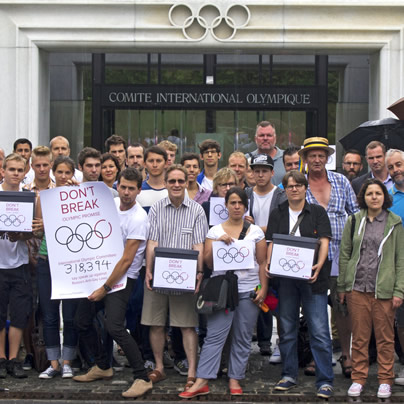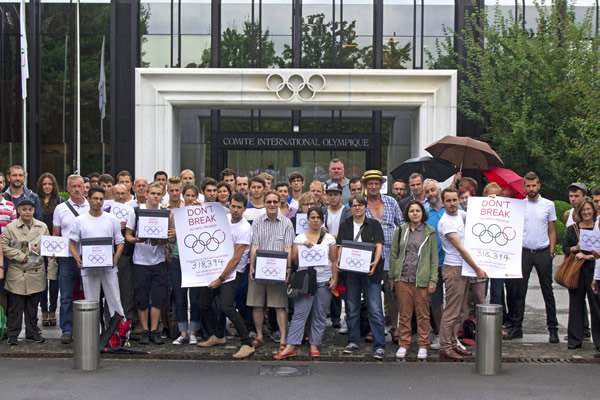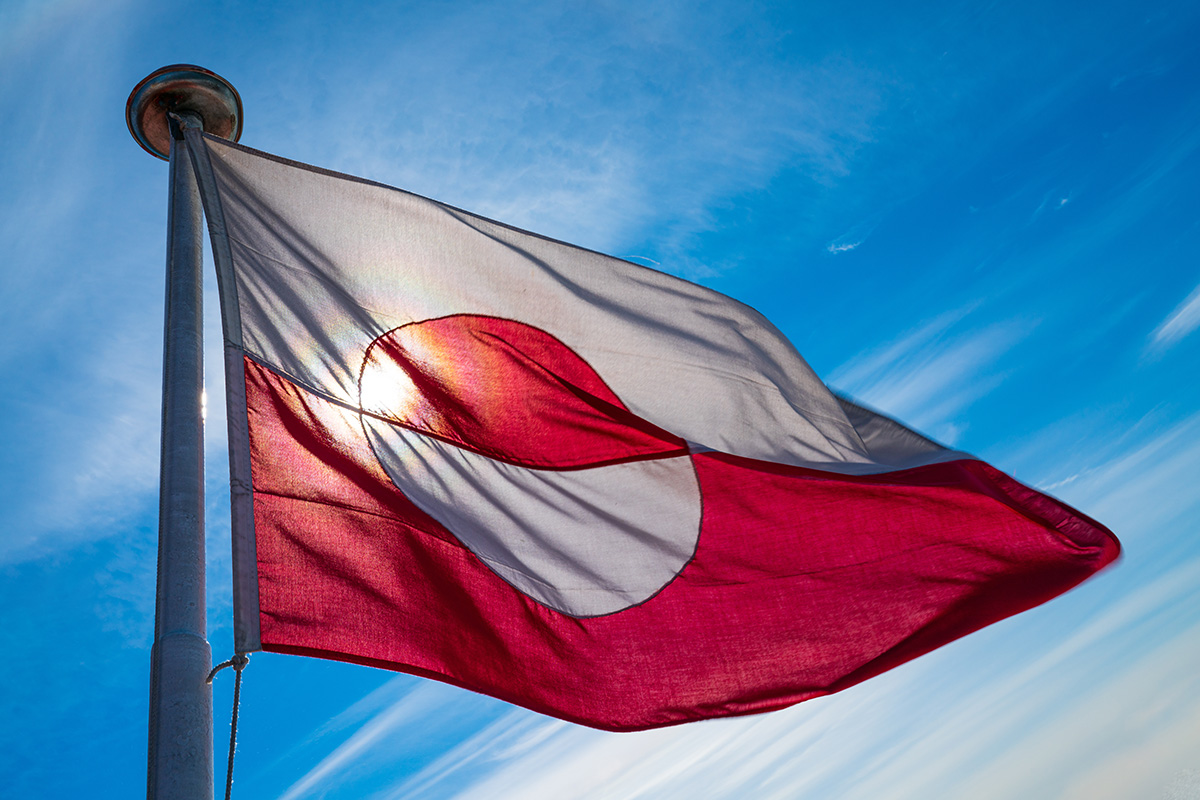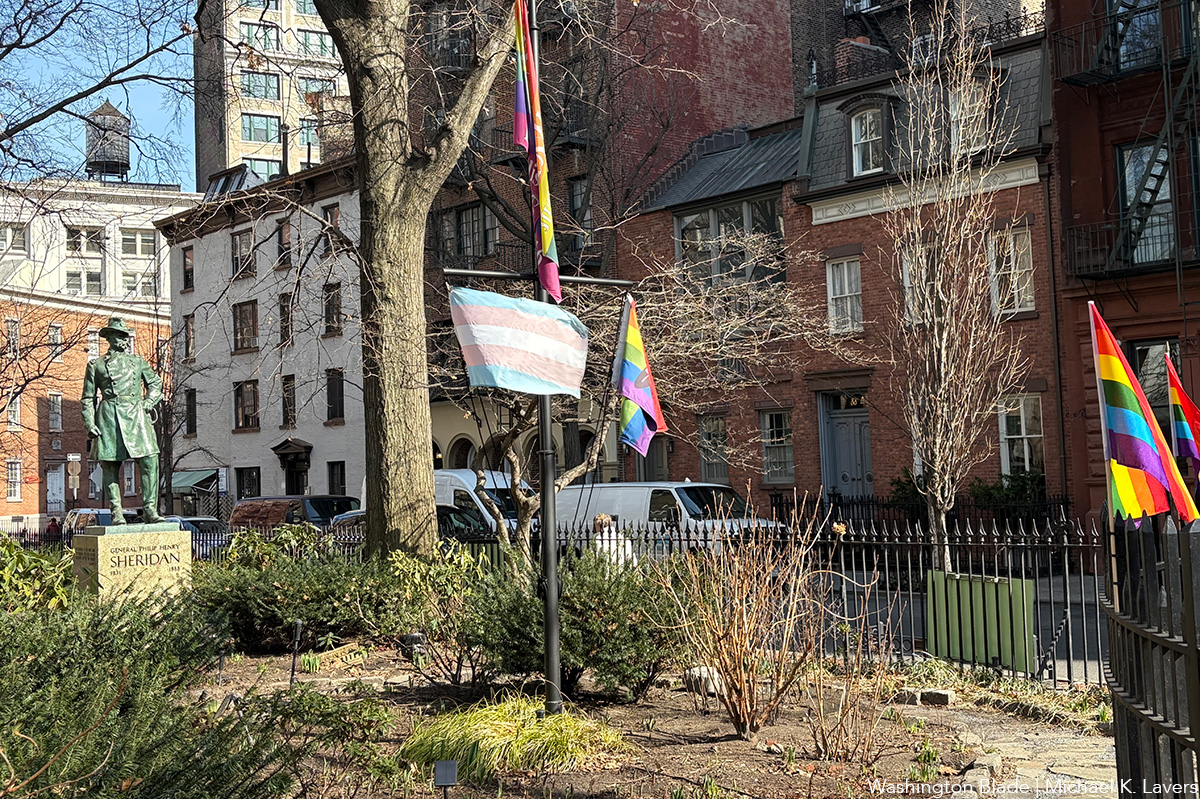News
U.S. runner speaks out against anti-gay Russian law in Moscow
Nick Symmonds made comments while dedicating track medal to gay friends


Members of All Out and Athlete Ally on August 7 presented a petition with more than 300,000 signatures to the International Olympic Committee that urges it to pressure Russia to end its gay crackdown. (Photo courtesy of All Out)
“As much as I can speak out about it, I believe that all humans deserve equality as however God made them,” the two-time Olympian told the Russian news agency RIA Novosti after he came in second in the men’s 800 meter final during the IAAF World Championship at Moscow’s Luzhniki Stadium. “Whether you’re gay, straight, black, white, we all deserve the same rights. If there’s anything I can do to champion the cause and further it, I will, shy of getting arrested.”
Symmonds criticized the gay propaganda law in an August 6 post to Runner’s World’s website before he traveled from London to Moscow to compete in the IAAF World Championship. He said in the same post he would not publicly criticize the statute while he was in Russia.
“I say this not out of fear of prosecution by the Russian government, but out of respect for the fact that I will be a guest in the host nation,” Symmonds wrote. “Just as I would not accept a dinner invite to a friend’s house and then lecture them on how to raise their kids, neither will I lecture the Russian government on how to govern their people.”
Symmonds’ latest comments come a day after the Russian Interior Ministry said it would enforce the gay propaganda law during the 2014 Winter Olympics that will take place in Sochi, Russia, in February.
Figure skater Johnny Weir, whose husband is of Russian descent, told CBS News in an interview posted to its website on August 9 that he is “not afraid of being arrested” while at the Sochi games. Retired tennis champion Martina Navratilova, gay Olympic diver Greg Louganis, President Obama and a coalition of LGBT advocacy groups that include Outsports.com are among those that oppose a boycott of the Olympics.
Out New Zealand speed skater Blake Skjellerup announced last month he will wear a Pride pin while in Sochi.
RIA Novosti reported that Symmonds is the first athlete to publicly criticize the gay propaganda law that President Vladimir Putin signed in June while on Russian soil.
“I respect Russians’ ability to govern their people,” Symmonds told RIA Novosti. “I disagree with their laws. I do have respect for this nation. I disagree with their rules.”
Greenland
The Greenland lesson for LGBTQ people
Playbook is the same for our community and Europeans

I understand my own geopolitical limits and don’t pretend to know how Europeans should respond to U.S. threats to seize Greenland or retaliate against anyone who opposes them. However, as I mentioned in March, it’s clear that for Europeans and LGBTQ+ people alike, hug-and-kiss diplomacy is over.
In practice, that means responding to the U.S. administration’s provocations with dialogue, human‑rights rhetoric, and reasoning may now be counterproductive. It looks weak. At some point, Europeans will have to draw a line and show how bullying allies and breaking international agreements carry a cost — and that the cost is unpredictable. On the surface, they have few options; like LGBTQ+ communities, they are very behind in raw power and took too long to wake up. But they still have leverage, and they can still inflict harm.
Maybe it is time for them to call the bluff. America has a great deal to lose, not least its reputation and credibility on the world stage. Stephen Miller and Pete Hegseth, with all their bravado, obviously underestimate both the short‑ and long‑term geopolitical price of ridicule. Force the United States to contemplate sending troops into an ally’s territory, and let the consequences play out in international opinion, institutions, and markets.
In the United States, LGBTQ+ communities have already endured a cascade of humiliations and live under constant threat of more. In 2025 our symbols and heroes were systematically erased or defaced: the USNS Harvey Milk was quietly renamed after a straight war hero, Admiral Rachel Levine’s title and image were scrubbed from official materials, Pride flags were banned from public buildings, World AIDS Day events were defunded or stripped of queer content, the Orlando memorial and other sites of mourning were targeted, the U.S. lead a campaign against LGBTQ+ language at the U.N., and rainbow crosswalks were literally ripped up or painted over. We cannot simply register our distress; we must articulate a response.
In practice, that means being intentional and focused. We should select a few unmistakable examples: a company that visibly broke faith with us, a vulnerable political figure whose actions demand consequences, and an institution that depends on constituencies that still need us. The tools matter less than the concentration of force — boycotts, shaming, targeted campaigning all qualify — so long as crossing certain lines produces visible, memorable costs.
A friend suggested we create what he called a “c***t committee.” I liked the discipline it implies: a deliberate, collective decision to carefully select a few targets and follow through. We need a win badly in 2026.
These thoughts are part of a broader reflection on the character of our movement I’d like to explore in the coming months. My friends know that anger and sarcasm carried me for a long time, but eventually delivered diminishing returns. I am incrementally changing these aspects of my character that stand in the way of my goals. The movement is in a similar place: the tactics that served us best are losing effectiveness because the terrain has shifted. The Greenland moment clarifies that we must have a two-pronged approach: building long-term power and, in the short term, punching a few people in the nose.
District of Columbia
Sold-out crowd turns out for 10th annual Caps Pride night
Gay Men’s Chorus soloist sings National Anthem, draws cheers

A sold-out crowd of 18,347 turned out on Jan. 17 for the 10th annual Pride Night at the Washington Capitals hockey game held at D.C.’s Capital One Arena.
Although LGBTQ Capitals fans were disappointed that the Capitals lost the game to the visiting Florida Panthers, they were treated to a night of celebration with Pride-related videos showing supportive Capitals players and fans projected on the arena’s giant video screen throughout the game.
The game began when Dana Nearing, a member of the Gay Men’s Chorus of Washington, sang the National Anthem, drawing applause from all attendees.
The event also served as a fundraiser for the LGBTQ groups Wanda Alston Foundation, which provides housing services to homeless LGBTQ youth, and You Can Play, a nonprofit organization dedicated to advancing LGBTQ inclusion in sports.
“Amid the queer community’s growing love affair with hockey, I’m incredibly honored and proud to see our hometown Capitals continue to celebrate queer joy in such a visible and meaningful way,” said Alston Foundation Executive Director Cesar Toledo.
Capitals spokesperson Nick Grossman said a fundraising raffle held during the game raised $14,760 for You Can Play. He said a fundraising auction for the Alston Foundation organized by the Capitals and its related Monumental Sports and Entertainment Foundation would continue until Thursday, Jan. 22

A statement on the Capitals website says among the items being sold in the auction were autographed Capitals player hockey sticks with rainbow-colored Pride tape wrapped around them, which Capitals players used in their pre-game practice on the ice.
Although several hundred people turned out for a pre-game Pride “block party” at the District E restaurant and bar located next to the Capital One Arena, it couldn’t immediately be determined how many Pride night special tickets for the game were sold.
“While we don’t disclose specific figures related to special ticket offers, we were proud to host our 10th Pride night and celebrate the LGBTQ+ community,” Capitals spokesperson Grossman told the Washington Blade.
The White House
A full year of Trump and LGBTQ rights: all that’s been lost
White House since Inauguration Day has relentlessly attacked LGBTQ community

Uncloseted Media published this story on Jan. 20.
By NICO DiALESANDRO | One year ago today, Donald Trump was inaugurated as president of the United States for the second time. Since then, he and his administration have waged an all-out attack on the LGBTQ community by slashing crucial health and support programs, pressuring states to exclude transgender people from most aspects of life and erasing information about the community’s history. Here are all the biggest moves Trump has made against LGBTQ rights over the last 365 days.
Jan. 20, 2025 – Trump’s second first day
During his inaugural address, Trump says, “As of today, it will henceforth be the official policy of the United States government that there are only two genders: male and female.” Later that day, Trump signs “Defending Women from Gender Ideology Extremism and Restoring Biological Truth to the Federal Government,” an executive order that defines “sex” in federal law to mean biological sex at conception. It also eliminates federal recognition of trans identities, blocks gender self-identification on federal documents, ceases federal funding for gender-affirming care and restricts trans people’s access to bathrooms, prisons, shelters, and other government facilities that match their gender identity.
Trump also signs “Ending Radical and Wasteful Government DEI Programs and Preferencing,” an executive order that orders federal agencies to terminate diversity, equity and inclusion mandates, policies and programs. This order repeals a policy put in place by the Biden administration that created initiatives for the federal government to combat systemic barriers related to hiring on the basis of race, religion, income, gender identity, sexual orientation, and disability.
“We’re the party of common sense, you know, we don’t want to have men playing in women’s sports. We don’t want to have transgender operations for everyone,” Trump says at the Liberty Ball party that evening. Trump would go on to repeat the sentiment countless times throughout the year, including at press conferences with world leaders, in an interview with “60 Minutes” and even while deploying the National Guard in Washington.
Jan. 21, 2025 – The flurry of executive orders continues
Trump signs “Ending Illegal Discrimination and Restoring Merit-Based Opportunity,” another executive order that revokes a 1965 order which mandated affirmative action for federal contractors and required that they take steps to comply with nondiscrimination laws. The order violates the U.S. Supreme Court’s 2020 decision in Bostock v. Clayton County, which extended Title VII sex-based protections to trans people.
Nearly all LGBTQ- and HIV-focused content and resources are deleted from the White House’s website including the White House’s equity report, information about LGBTQ Pride Month and a fact sheet on expanding access to HIV prevention and treatment. In addition, the State Department removes its LGBTQ rights page, and the Department of Labor removes its LGBTQ workers page.
Jan. 28, 2025 – funding cuts
Trump signs “Protecting Children from Chemical and Surgical Mutilation,” an executive order that bars federal funding for gender-affirming care for minors and directs the Department of Health and Human Services to restrict insurance coverage for such treatments under Medicare, Medicaid and the Affordable Care Act. Hours after Trump signs the order, Uncloseted Media speaks with six LGBTQ kids to get their thoughts.
“For me, it’s definitely very frightening. Especially because right now I’m 16, and so, I’m going to become an adult over the course of his presidency. … And it’s really difficult, especially to plan for the future and have that lack of surety that I thought that I would,” Crow, who lives in Virginia, told Uncloseted Media.
Feb. 3, 2025
Mentions of LGBTQ people are erased or minimized across federal government websites, with a particular focus on trans and intersex people. The State Department first removes trans people in its travel safety guidelines, only mentioning the “LGB” community. As of publication, the web page has no mention of bisexual travelers either.
Feb. 5, 2025
Trump signs “Keeping Men Out of Women’s Sports,” an executive order that prohibits trans women and girls from competing on collegiate female sports teams.
Feb. 13, 2025
Under the direction of Trump’s executive order, the National Park Service removes references to trans and queer rights and history, including from the Stonewall National Monument pages. The “TQ” from “LGBTQ” is dropped in instances where the acronym is present. Protesters gather at the Stonewall National Monument in New York the next day to voice their outrage.
In an interview with Uncloseted Media, Stacy Lentz, co-owner of the Stonewall Inn, calls the removal a blatant attempt to rewrite history and exclude the very people who led the fight for equality.

Feb. 14, 2025
The U.S. withdraws from the United Nations LGBTI Core Group, which formed in 2008 and pledges to support LGBTQ and intersex rights by “work[ing] within the United Nations framework on ensuring universal respect for the human rights and fundamental freedoms for all, specifically lesbian, gay bisexual, transgender and intersex (LGBTI) persons, with a particular focus on protection from violence and discrimination.”
March 15, 2025 – illegal deportations
The Trump-Vance administration deports 238 Venezuelan migrants to CECOT, a maximum-security prison in El Salvador. The administration claims these individuals are affiliated with the Tren de Aragua gang. Andry Hernández Romero, a gay makeup artist seeking asylum, is one of the migrants with no criminal record. Hernández vanished from U.S. custody before his asylum hearing, and his lawyer asserts he was deported without due process.

On July 18, Hernández is returned to Venezuela along with 249 other migrants. The Department of Homeland Security dismisses abuse allegations of torture, sexual assault and other inhumane treatment.
April 2, 2025
U.S. Citizenship and Immigration Services updates its policy to recognize only two biological sexes, male and female, for immigration benefit requests and official documentation. This policy shift reverses previous efforts to accommodate nonbinary and trans individuals, as it removes the “X” gender marker option from immigration forms.
“By denying trans people the right to self-select their gender, the government is making it harder for them to exist safely and with dignity. This is not about ‘common sense’ — it is about erasing an entire community from the legal landscape,” says Bridget Crawford, director of law and policy at Immigration Equality.
April 3, 2025
In his first few months in office, Trump and his administration cancel over 270 National Institutes of Health grants focused on LGBTQ health, totaling at least $125 million in unspent funds. The cancellations disrupt research on HIV testing and prevention, AIDS, cancer, mental health and more.
The cuts scrap more than $800 million worth of research into the health of LGBTQ people. The cuts abandon studies of cancers and viruses and set back efforts to defeat a resurgence of sexually transmitted infections. They also eliminate swaths of medical research on diseases that disproportionately afflict LGBTQ people, including HIV/AIDs, various sexually transmitted infections and cancers.
June 2, 2025
Stanford begins suspending gender-affirming care for people younger than 19 in response to Trump’s executive order. Other major health networks and many regional centers across the country begin following suit.
Children’s Hospital Los Angeles announces they will be cutting off care for patients as old as 25 beginning in July, stating that they were left with “no viable alternative” because they could not risk any cuts to their federal funding.
June 6, 2025
Trump’s military ban begins, disallowing trans people from serving in all branches of the armed forces and removing those currently in the service. Those who do not identify themselves will have their medical records surveyed and be involuntarily separated if it is discovered that they are trans.
July 1, 2025
Trump’s “Big Beautiful Bill” is passed by Congress. The sweeping package of tax breaks that largely benefit the wealthy include major funding cuts to LGBTQ health care as well as a number of support programs that disproportionately serve queer people.
July 17, 2025
The Trump-Vance administration officially shuts down the LGBTQ-specific option on the 988 youth suicide hotline. This comes a year after data finds that 41 percent of LGBTQ youth seriously considered suicide. Notably, there are no plans to shut down the other targeted hotline options. Arden, who called when they were 16, told Uncloseted Media, “If it weren’t for the hotline, I would have killed myself.”
Aug. 4, 2025
U.S. Immigration and Customs Enforcement arrests 40-year-old asylum seeker Rickardo Anthony Kelly during a routine immigration appointment. Kelly, who survived being shot 10 times in Jamaica by attackers who targeted him for being gay, is released two weeks later and describes the conditions of the ICE facility as “unconscionable,” “inhumane,” and “horrific.”
Aug. 12, 2025
The State Department releases a revised 2024 human rights report that omits references to LGBTQ people and erases mentions of discrimination based on sexual orientation or gender identity. The report also removes critiques of governments for mistreating LGBTQ communities.
It excludes information about Hungary’s anti-LGBTQ laws that encourage citizens to report their LGBTQ neighbors and that ban depictions of homosexuality or gender transition in schools or the media.
Aug. 15, 2025
The Trump-Vance administration announces plans to eliminate gender-affirming care from the Federal Employees Health Benefits Program starting in 2026. The policy would also block access to hormones and surgeries for federal workers and their families.
Aug. 20, 2025
The media reports on court filings that reveal that the Justice Department issued subpoenas to hospitals for private medical records of LGBTQ patients 18 and younger. The DOJ requests billing data, communication with drug manufacturers, Social Security numbers and recordings from providers who treat gender nonconforming minors. Doctors across the country report threats and fear government retaliation.
“The subpoena is a breathtakingly invasive government overreach. … It’s specifically and strategically designed to intimidate health care providers and health care institutions into abandoning their patients,” says Jennifer L. Levi, senior director of transgender and queer rights at GLAD law, an LGBTQ legal group and civil rights organization.
Sept. 4, 2025
In response to a mass shooting in Minneapolis that was carried out by a trans woman, CNN reports that the DOJ is considering restricting trans Americans’ Second Amendment rights. The department aims to justify a firearm ban by declaring trans people mentally “defective,” building off of Trump’s trans military ban. The proposal sparks backlash from the National Rifle Association, who says in a statement that they will not “support … gun bans that arbitrarily strip law-abiding citizens of their Second Amendment rights.”
Sept. 12, 2025
The DOJ removes a study from its website showing that far-right extremists have killed more Americans than any other domestic terrorist group. The archived report disappears two days after anti-LGBTQ conservative activist Charlie Kirk is assassinated.

Sept. 22, 2025
White House Press Secretary Karoline Leavitt claims the administration is investigating why trans people are turning to “domestic terrorism,” despite no evidence of this. She calls anyone denying the false link “willfully ignorant,” despite the most recent data available from 2018 showing that trans people are four times more likely to be victims of violent crime when compared to cisgender people.
Sept. 23, 2025
Trump cancels a budget meeting and blames a potential government shutdown on Democrats’ support for trans-inclusive policies.
Oct. 1, 2025
FBI Director Kash Patel fires a trainee for displaying a Pride flag on his desk, labeling it an improper “political” message. The dismissal follows reports that pro-Trump appointees are combing internal FBI files to identify LGBTQ employees.
Oct. 3, 2025
Education Secretary Linda McMahon sends a nine-page proposal to nine universities that asks for a commitment to ban trans-inclusive facilities, define sex by “reproductive function” and limit race, gender or identity factors in admissions. The proposal calls for schools to revise their governance structures by “abolishing institutional units that purposefully punish, belittle, and even spark violence against conservative ideas.”
Oct. 10, 2025
The White House lays off more than 1,100 HHS employees. The Office of Population Affairs, which administered Title X family-planning networks, teen pregnancy prevention and LGBTQ health initiatives, is eliminated.
Nov. 6, 2025
The Supreme Court grants the Trump-Vance administration’s request to put a hold on federal rulings in Massachusetts, affecting trans and nonbinary people by preventing them from self-identifying correctly on their IDs, claiming to be in line with Trump’s “Defending Women from Gender Ideology Extremism and Restoring Biological Truth to the Federal Government” executive order. In her dissent, Justice Ketanji Brown Jackson writes, “This court has once again paved the way for the immediate infliction of injury without adequate (or, really, any) justification. Because I cannot acquiesce to this pointless but painful perversion of our equitable discretion, I respectfully dissent.”
Dec. 4, 2025
According to a memo obtained by NPR, the DOJ instructs inspectors to stop evaluating prisons and jails using standards designed to protect trans, intersex, and gender nonconforming people from sexual violence. This is in direct violation of the Prison Rape Elimination Act.
Dec. 18, 2025
HHS Secretary Robert F. Kennedy Jr. and Mehmet Oz, who leads Medicaid and Medicare, announce that HHS is heavily restricting trans health care; prohibiting Medicaid reimbursement for gender-affirming care for people under 18; and blocking all Medicare and Medicaid funding for hospitals that provide the care to minors.
Jan. 1, 2026
The Office of Personnel Management institutes policy changes that exclude coverage for “chemical and surgical” gender-affirming care in the FEHB and Postal Service Health Benefits plans for 2026, with narrow exceptions.
Jan. 7, 2026
Renee Good is shot and killed by ICE agent Jonathan Ross in Minneapolis. Good leaves behind a wife, Becca, and three children. In a statement, Becca remembers her wife:
“Renee lived by an overarching belief: there is kindness in the world and we need to do everything we can to find it where it resides and nurture it where it needs to grow. Renee was a Christian who knew that all religions teach the same essential truth: we are here to love each other, care for each other, and keep each other safe and whole.”

Days later, Trump tells reporters, “At a very minimum, that woman was very, very disrespectful to law enforcement. … It was highly disrespectful of law enforcement. The woman and her friend were highly disrespectful of law enforcement.”
Additional reporting by Hope Pisoni. Washington Blade photos by Michael Key and Michael K. Lavers.

















